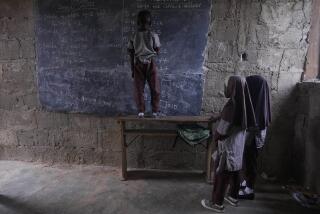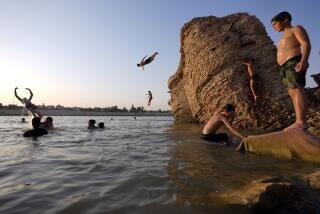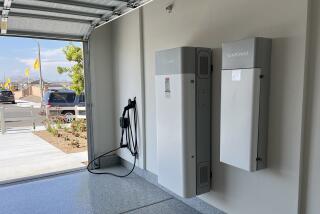Power-starved Iraq goes solar
- Share via
BAGHDAD — In a city with constant electricity shortages but no lack of sunshine, the new buzz is solar energy.
Teams of engineers have appeared along major Baghdad roadways, bolting panels and bulbs to rows of towering steel poles to make solar-powered streetlights.
The workers who turned up recently in the upscale Karada district approached the task with near-religious fervor.
“We are lighting up the city with solar power,” Sajad Hussein declared when queried by curious residents. “People say it is a gift from God.”
Surging oil prices have fueled interest in solar power and other renewable energy sources in California and across the United States, where pressure also is building to reduce greenhouse gas emissions to fend off global warming.
But Iraq’s decision to embrace clean energy has little to do with cost cutting or the environment: The country’s policymakers want to improve security, and the national grid doesn’t supply enough electricity to illuminate city streets.
For Iraqis, the lack of reliable power has been one of the biggest frustrations of the war. The U.S. government has committed $4.91 billion to repairing the ravaged electricity infrastructure and bringing new generating units online. But most Iraqis can count on just a few hours of power a day.
Faced with another long, hot summer without sufficient electricity, an Iraqi journalist confronted a U.S. general at a news conference in spring and demanded to know why the military wasn’t harnessing the sun’s rays for the national grid.
Brig. Gen. Jeffrey Dorko, commander of the U.S. Army Corps of Engineers in Iraq, said the cost was prohibitive.
“A rough standard worldwide is it costs approximately $1 million to create a power plant to generate one megawatt of power,” he said. “The cost per one megawatt for solar power is several times that, maybe $6 million or $7 million per megawatt.”
But U.S. and Iraqi officials agree that solar energy can be useful on a more limited scale, such as powering a street lamp without having to rely on the dysfunctional electricity system.
Iraq’s electricity grid was already in a state of disrepair after years of sanctions when U.S.-led forces invaded in March 2003. The U.S. efforts have added about 2,200 megawatts of daily generating capacity, which now stands at about 5,500 megawatts.
But the growth in demand has far outpaced supply. Iraqis are snapping up the fridges, air conditioners and other energy-consuming devices that have come onto the market since the fall of Saddam Hussein.
U.S. reconstruction efforts have added to the pressure on the national grid as new hospitals, schools, water treatment plants and other facilities come online. Essential services are guaranteed a near-continuous supply of electricity, which leaves little for business and residential consumers.
Although capacity has improved, production levels rarely achieve their potential. Transmission towers are frequently attacked, causing disruptions throughout the network. A severe drought has reduced output from hydroelectric plants by nearly 30%. The sector also is beset by fuel shortages.
Iraq sits atop the world’s third-largest proven oil reserves. But the country has limited refining capabilities and imports large quantities of diesel to keep its turbines spinning.
However, there is no shortage of sunshine, said Aziz Shimari, spokesman for the Electricity Ministry. Iraq is a country of vast deserts where summer temperatures can top 120 degrees.
“This offers us more possibility of producing power,” Shimari said. Light is “an important condition for security, so people will go out at night.”
The ministry plans to install 5,000 solar-powered streetlights in Baghdad at a cost of $1,800 to $2,000 apiece. There also are plans to install 1,000 units in each of Iraq’s 18 provinces.
The U.S. military has bought more than 1,000 additional lights for Baghdad and has funded similar projects in Fallouja, Ramadi and other cities. The lights being installed by the military in Baghdad are bulletproof and cost about $6,200 each, officials said.
Grocer Mohammed Abbas was in a good mood as the city’s municipal crews installed the new lights in front of his Karada store.
“Light provides half our security,” he said on a searing afternoon, reaching into a fridge to pull out an ice cream for a little girl in pigtails. “I stay open until 10 p.m. Now that the lights are in, I can stay open even later.”
At the dry cleaner next door, Basil Dawood wasn’t so sure about the benefits of the system.
“Even if the streets are lit, if there is no electricity and our store is dark, no one can see us,” Dawood said. “What we really need is good national power.”
Baghdad is averaging about 13 hours of power a day, but most of that power is consumed by government offices and essential services.
On a good day, Abbas and Dawood get six hours. The two men said they spend up to half their profits on alternative sources of power.
Abbas pays the equivalent of about $180 a month for a feed from a privately run neighborhood generator, which supplies an additional eight to 10 hours a day.
Dawood has his own generator, but says it costs too much to run during the day. When the lights flickered out for the umpteenth time that day, he settled into a chair in front of the silent washing machine, dabbing at beads of sweat with a tissue, to wait for the power to come back on.
Advocates say the solar-powered streetlights will reduce the load on the national grid and won’t be as vulnerable to attack because they operate independently. But the hot, dry climate will present maintenance challenges.
Each pole is equipped with a panel of photovoltaic cells wired to a battery, which charges during the day and switches on automatically at night to power an orange bulb. But the panels don’t function well through the layers of dust and grime that can accumulate in a matter of days, officers say. And extreme heat reduces the life span of the batteries.
A soldier who chronicled his deployment to Iraq in a blog called David’s War Diary -- davidswardiary.blogspot.com -- commented on the “scores of gorgeous solar-powered streetlights” installed at Camp Virginia in Kuwait, where he stopped on his way home in November.
“Being so closely spaced, they make superb road markers,” he wrote. “Illumination, however, comes from the noisy, gas-powered generator light systems placed along each row of solar-powered streetlights.”
Asked what she thought of the new lights going up in her neighborhood, Karada resident Menai Karim shrugged.
“They’re useless,” she said as she filled a shopping basket at Abbas’ store. “They aren’t very bright. But it’s better than nothing.”
--
More to Read
Sign up for Essential California
The most important California stories and recommendations in your inbox every morning.
You may occasionally receive promotional content from the Los Angeles Times.










